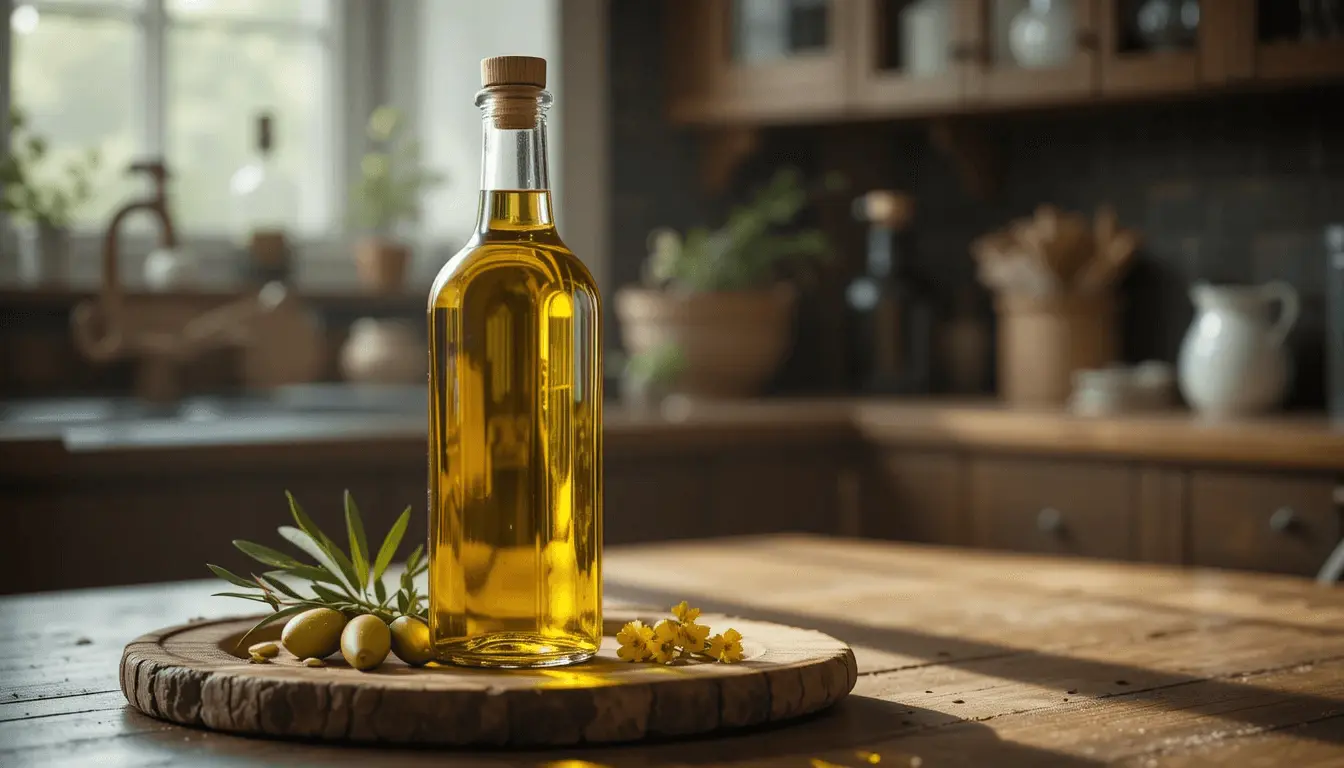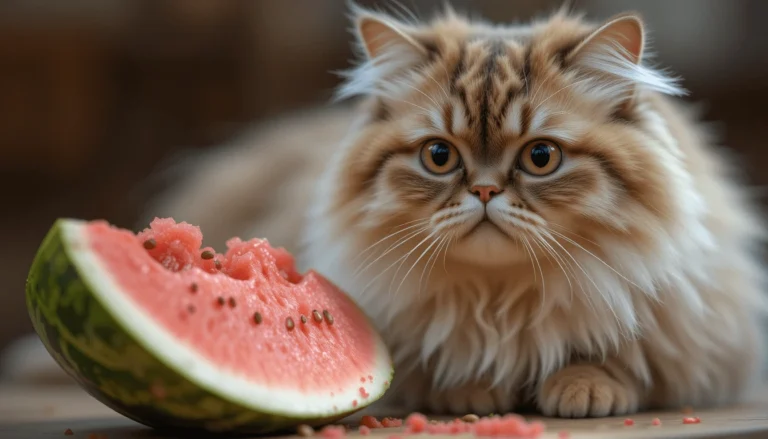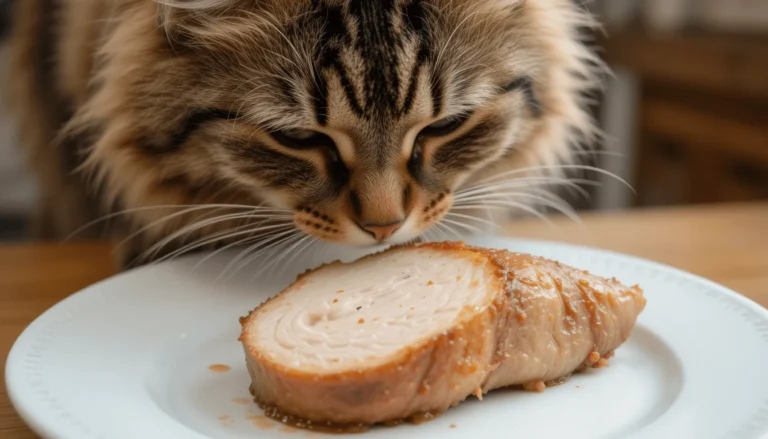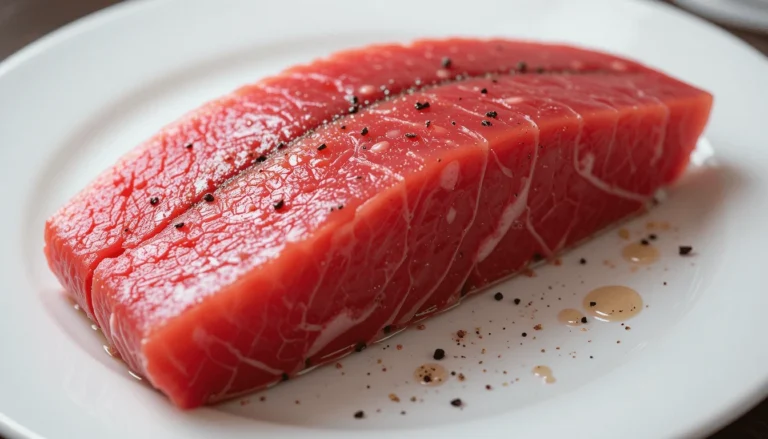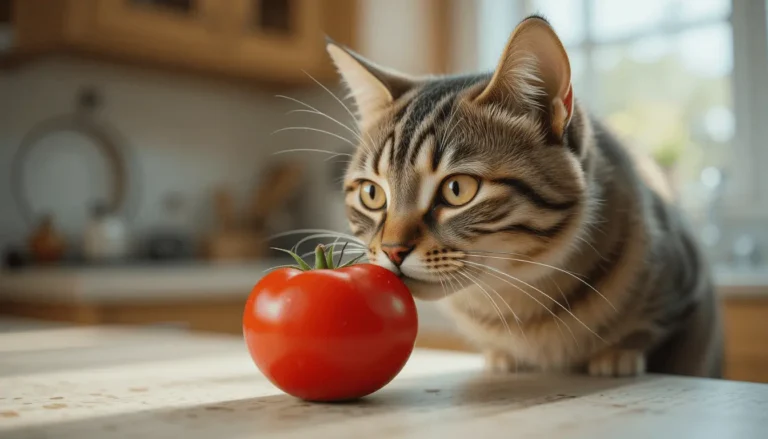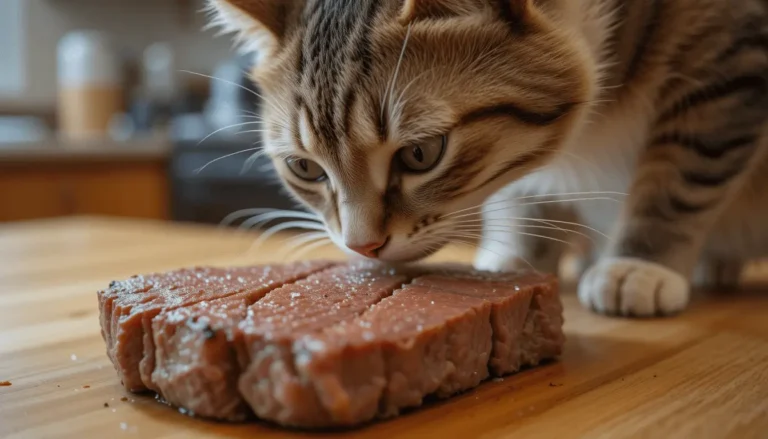Is Olive Oil Safe for Cats? What Every Pet Owner Should Know
Introduction
“Last Tuesday, my curious tabby, Whiskers, leaped onto the kitchen counter and knocked over a bottle of olive oil. As I watched him sniff the golden puddle, my heart raced—is olive oil safe for cats? Like many pet owners, I assumed ‘natural’ meant ‘harmless,’ but a quick vet call revealed surprising truths. While olive oil isn’t toxic, its effects on cats range from shiny coats to upset tummies—and knowing the difference could save your feline’s health. Let’s unravel the facts, so you’re prepared when curiosity strikes.”
Can Cats Consume Olive Oil Safely?
The Science Behind Olive Oil and Feline Digestion
Cats have a unique digestive system optimized for animal-based proteins and fats. Unlike humans, they lack certain digestive enzymes needed to efficiently break down plant-derived oils. According to veterinary nutritionists at the Cornell Feline Health Center, cats can only digest about 50-60% of the fats in olive oil compared to 90% of animal-based fats.
The monounsaturated fats in olive oil (oleic acid) that benefit human cardiovascular health don’t provide the same advantages to cats. Their bodies specifically require arachidonic acid, an essential fatty acid found only in animal tissues. This explains why plant oils don’t offer meaningful nutritional value for felines.
Safe Quantities: How Much Is Too Much?
If you choose to give your cat olive oil (perhaps for hairball relief or constipation), strict moderation is crucial:
Recommended Guidelines:
- Dosage: No more than 1/4 teaspoon per meal
- Frequency: Maximum 1-2 times weekly
- Administration: Always mix thoroughly with regular food
Weight-Based Considerations:
| Cat Weight | Maximum Safe Amount |
|---|---|
| Under 5 lbs | 1/8 teaspoon |
| 5-10 lbs | 1/4 teaspoon |
| Over 10 lbs | 1/2 teaspoon |
The ASPCA Animal Poison Control Center notes that while olive oil isn’t toxic, amounts exceeding these recommendations may lead to:
- Pancreatic stress
- Digestive upset
- Unhealthy weight gain
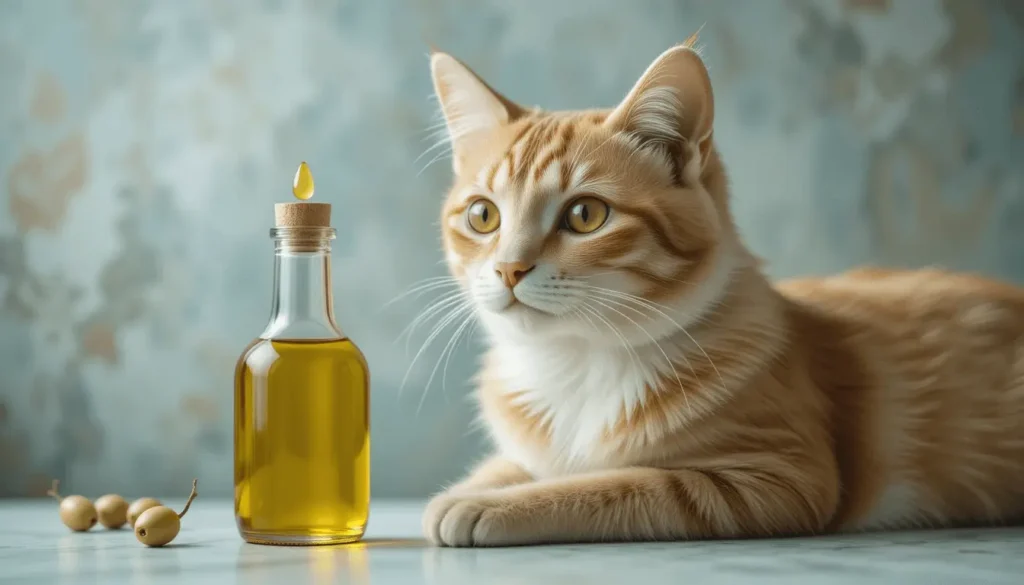
Signs of Olive Oil Intolerance in Cats
Every cat reacts differently. Monitor closely for these warning signs after olive oil consumption:
Digestive Symptoms:
- Greasy, loose stools or diarrhea
- Excessive vomiting (especially yellow bile)
- Loss of appetite
Physical Changes:
- Unusual lethargy lasting more than 12 hours
- Dull, greasy-looking coat
- Skin irritation or excessive grooming
Behavioral Cues:
- Avoiding food that contains the oil
- Increased thirst
- Hiding or signs of discomfort
If symptoms persist beyond 24 hours or include bloody stool, seek immediate veterinary care. Some cats may develop pancreatitis – a painful inflammation of the pancreas that requires medical treatment.
Pro Tip: Before using olive oil to address hairballs or constipation, consider safer alternatives like:
- Veterinary-approved hairball remedies
- Increased hydration (water fountains, wet food)
- Regular brushing to reduce ingested fur
While is olive oil safe for cats in minimal amounts? Technically yes. But is it necessary or recommended? Most veterinarians agree there are better options specifically formulated for feline health needs.
Potential Benefits of Olive Oil for Cats
Skin and Coat Health: Omega Fatty Acids Explained
Olive oil contains omega-3 and omega-6 fatty acids that may benefit some cats’ coats when used sparingly. However, cats convert plant-based fatty acids less efficiently than animal-based sources like fish oil.
Key considerations:
- The linoleic acid in olive oil may help maintain skin barrier function
- Effects are typically less noticeable than with animal-derived omega supplements
- Results vary significantly between individual cats
According to Tufts University’s Veterinary Nutrition Team, “While olive oil isn’t harmful in small amounts, there are more effective options for improving feline coat health.”
Digestive Aid: Olive Oil for Hairball Relief
Many cat owners use olive oil as a natural remedy for hairballs. The oil may help:
- Lubricate the digestive tract
- Ease passage of hair through the system
- Reduce occasional constipation
However, the American Society for the Prevention of Cruelty to Animals (ASPCA) recommends safer alternatives specifically formulated for cats, as excessive oil can lead to diarrhea and nutrient malabsorption.
Antioxidant Properties: Myth or Reality?
While olive oil contains polyphenols and vitamin E that benefit humans, cats derive minimal antioxidant benefits from these plant compounds. Their systems are designed to obtain antioxidants primarily from animal tissues.
Important notes:
- Cats have different metabolic pathways than humans
- The antioxidant dose in typical olive oil portions is negligible for felines
- Some compounds may even be difficult for cats to process
Risks and Precautions Every Owner Must Know
Choking Hazards and High-Fat Dangers
Administering olive oil improperly can pose immediate risks:
- Aspiration risk: Cats may inhale oil if forced to consume it
- Calorie density: Just one teaspoon contains about 40 calories (10% of a cat’s daily needs)
- Pancreatic stress: Sudden high-fat intake can trigger digestive upset
The Merck Veterinary Manual warns that high-fat foods may precipitate pancreatitis in susceptible cats, a potentially serious condition requiring veterinary care.
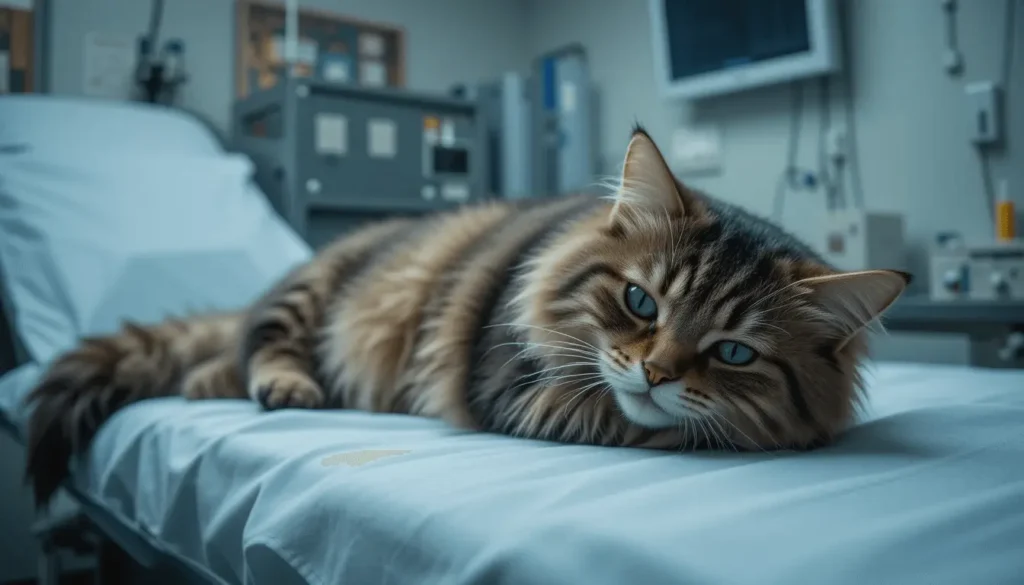
Long-Term Effects: Weight Gain and Pancreatitis
Regular olive oil consumption can lead to:
| Risk Factor | Likelihood | Potential Outcome |
|---|---|---|
| Weight gain | High | Obesity-related diseases |
| Pancreatitis | Moderate | Painful inflammation |
| Nutrient imbalance | Low | Vitamin deficiencies |
A 2022 study in the Journal of Feline Medicine found that cats consuming plant oils regularly were 2.3 times more likely to develop obesity than those on species-appropriate diets.
Vet-Recommended Alternatives to Olive Oil
For common issues where owners might consider olive oil, veterinarians suggest:
- Hairball control:
- Specialized hairball formulas
- Regular brushing
- Increased hydration
- Skin/coat health:
- Omega-3 supplements from fish oil
- Balanced commercial diets
- Veterinary-prescribed supplements
- Digestive health:
- Probiotics formulated for cats
- Increased fiber intake
- Prescription digestive aids
Conclusion
After exploring both the potential benefits and risks, the answer to is olive oil safe for cats? comes down to moderation and purpose. While not toxic in small amounts, olive oil offers minimal nutritional benefits for cats compared to species-appropriate alternatives. The occasional 1/4 teaspoon might help with temporary hairballs or constipation, but regular use could lead to weight gain, digestive issues, or more serious conditions like pancreatitis.
For optimal feline health, consider these vet-approved resources:
- Safe Or Not ? Cat Food Guide
- ASPCA’s Guide to Cat Nutrition
- Cornell Feline Health Center’s Dietary Recommendations
- AAHA’s Guidelines on Feline Obesity Prevention
Ultimately, while olive oil isn’t poisonous to cats, it’s far from an ideal supplement. Your feline’s nutritional needs are best met through high-quality commercial diets or veterinarian-approved supplements. Before adding any human foods to your cat’s diet, ask yourself: When it comes to your cat’s health, shouldn’t you choose options specifically designed for their unique biology?
FAQs
1. Can I give my cat olive oil daily for a shiny coat?
No. While some owners report improved coat condition, daily olive oil poses more risks than benefits. The high fat content can lead to obesity and pancreatitis over time. For coat health, opt for:
- Omega-3 supplements from fish oil (specifically formulated for cats)
- High-quality commercial cat foods with animal-based fats
- Regular grooming to distribute natural oils
2. How much olive oil can I give my cat for constipation?
For occasional constipation relief:
- Use no more than 1/4 teaspoon mixed into food
- Limit to once every few days
- Discontinue if diarrhea occurs
Better alternatives include:
- Increased water intake (try a cat water fountain)
- Vet-approved laxatives or hairball remedies
- Canned pumpkin (plain, in small amounts)
3. Are some cats more sensitive to olive oil than others?
Yes. Watch closely for these risk factors:
- Senior cats or those with pre-existing conditions
- Overweight or sedentary cats
- Cats with sensitive digestive systems
- Breeds prone to pancreatitis (like Siamese)
4. What should I do if my cat accidentally drinks olive oil?
For small amounts (less than 1 teaspoon for an average cat):
- Monitor for 24 hours
- Watch for vomiting or diarrhea
- Ensure access to fresh water
For larger amounts or if symptoms appear:
- Contact your veterinarian immediately
- Have the product label ready (extra virgin vs. infused oils)
- Note the time and amount consumed
5. Are other cooking oils safer than olive oil for cats?
Not necessarily. While some oils have different fatty acid profiles:
- Coconut oil: Similarly unnecessary, though some use it topically
- Fish oil: More beneficial but requires proper dosing
- Vegetable oils: Often higher in omega-6, which can cause inflammation
The safest approach? Stick to:
- Commercial cat foods with balanced nutrition
- Vet-approved supplements when needed
- Species-appropriate treats in moderation
Remember, cats thrive on consistency in their diets. While occasional olive oil might not harm a healthy cat, it’s not a recommended part of feline nutrition. When in doubt, your veterinarian can provide personalized advice tailored to your cat’s specific needs and health status. After all, isn’t your feline companion worth the very best care?

